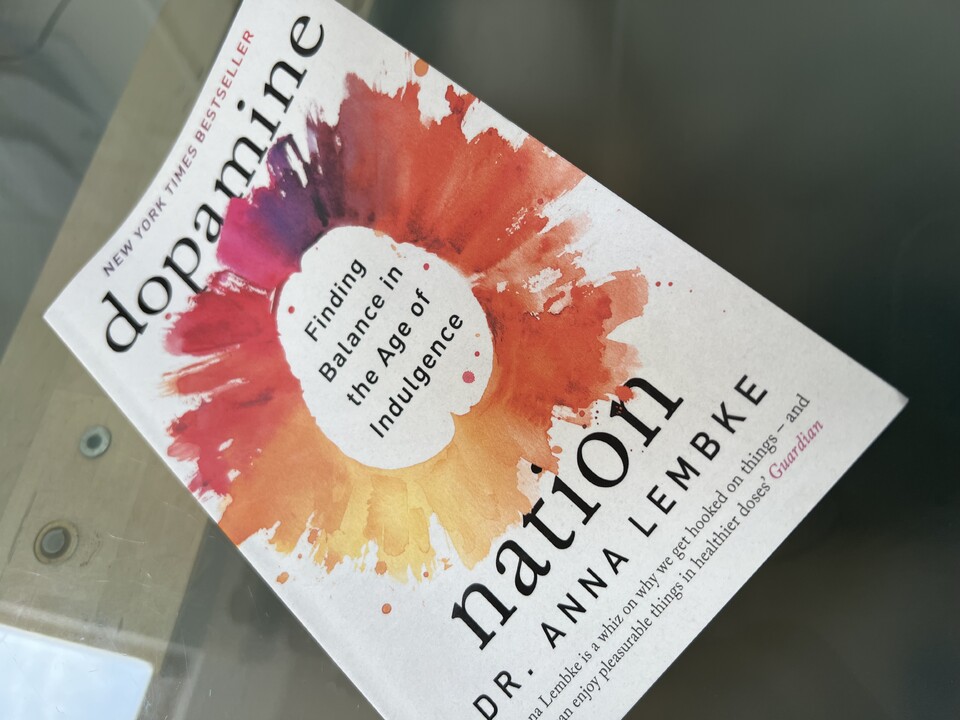Background
Dopamine Nation by Dr Anna Lembke has been on my reading list for a while, and as it it was also relevant for the literature review of my Masters dissertation that explores habit management, I finally got round to reading it. What follows is my personal short review.
Introduction
Psychiatrist Dr Anna Lembke, discusses the danger of excessively engaging in activities that result in Dopamine (the pleasure drug) being released in the brain.
In a world of abundance, convenience, over consumption and indulging in pleasurable activities and substances such as eating, alcohol, drugs, pornography, screen-time, scrolling and video games has become easy. Too easy.
With different activities and substances resulting in the release of varying amounts of Dopamine.
For these short lived highs, it turns out, whilst a little pleasure may feel good, too much of this kind of pleasure is pretty bad for us.
Her Psychiatric Career & Cases
Dr Lembke shares previous interactions with her clients (with their permission and names changed) including people using an array of substances and exhibiting an range of addictive behaviour including
- Students convinced they needed Marijuana, Aderrall and more to function
- Runners who wouldn't stop running even after fractured shins
- Someone incessantly pleasuring themselves with a home made TENS machine
She even shares her previous self confessed addiction to romance novels, reading them voraciously, every chance she got until it became disruptive to her personal and work life.
Pain and Pleasure
Dr Lembke discussed the connection between pain and pleasure exemplified by the growing trend of cold showers and ice baths citing one gentleman that only after sharing how he had multiple cold baths every day, realised it was excessive.
Sometimes people use pleasure to escape their pain, and sometimes pain is used to cause pleasure.
We are too averse to being uncomfortable or experiencing any minor pain, choosing to medicate or replace that pain can be unhealthy. Pain is often trying to tell us something and it can be useful. It is better to understand the reason for the pain and deal with it. A healthy balance of pain and pleasure is preferred.
Hormesis - "A branch of science that studies the beneficial effects of administering small to moderate doses of noxious or painful stimuli".
Self Binding
The practice of introducing barriers to bad behaviour. For example not keeping alcohol in the house, removing apps, setting spending limits or adding your name to a casinos "do not admit" name list.
Delayed Gratification
A lot of the books I read these days (and this one is no different) mention the same experiment from the 1960's led by Psychologist Walter Mischel whereby children between the age of 3 and 6 are left in an empty room with a marshmallow for approximately 15 minutes with the promise of another marshmallow (2 in total) if they can wait the full 15 minutes before eating it.
If you are unfamiliar with the study, approximately a third of the children managed to wait the full 15 minutes displaying greater delayed gratification.
Interestingly, those displaying greater aptitude for delayed gratification, have been found to go on to achieve better SAT scores, levels of education, be better socially adjusted adults and I think I recall from another book, had on average, a lower BMI.
It seems delayed gratification is a good skill/trait to have and a lack of it can manifest in other ways such as increased likelihood of addiction and unhealthy behaviour.
Takeaways
I liked the term "digital drugs" Dr Lembke used. Our mobile phones and whether you use Facebook, TikTok or YouTube is literally causing dopamine releases in the brain when you scroll.. the anticipation of what random thing you'll watch/read next.
Anticipation - It is also the anticipation of a reward from an activity that releases the dopamine, as well as the actual activity itself.
Varying rewards - It turns out more dopamine is released in the anticipation or a reward that may vary, compared to known reward. A fact that gambling machines take advantage of.
Diminishing returns - Repeated exposure to the same activity can often result in a lack or reduced ability to find pleasure in the activity subsequently. A dysphoria known as Anhedonia. Apparently it is not uncommon for very frequent skydivers to become bored with "normal life".
Homeostasis - When too much dopamine is released into the body, its natural balance is disturbed, in extreme cases leading to physical changes in the brain. It is reassuring to know that even after serious addiction the neuroplasticity of our brain can allow it to once again achieve homeostasis (balance).
Dopamine fasting - What is effectively happening when we try to stop an addictive habit.
Prosocial shame - Shame as a constructive mechanism (as opposed to destructive shame). Utilized well by Alcoholics Anonymous.
False self - The image we project to others, often exaggerated and glorified and often not reflecting reality. Social media has been blamed for enabling the promotion of unachievable and or unrealistic lifestyle expectations that can upset people who feel they aren't achieving the same level of happiness & success as others.
Summary
I don't think the problem of easy dopamine fixes, particularly through the increased enablement through technology is sufficiently talked about. We are seeing entire generations that have no delayed gratification, reduced attention spans and who expect everything quickly with little or no effort.
I see my own kids on their screens with dread, though now understand better, the biology of what is happening.
Dr Lemke prescribes a balanced approach to life, seeking pleasure in the little natural things, like a sunset and to be mindful of the things that cause us pleasure and pain in an attempt to keep an eye on how they are truly effecting us.
We don't want to stop the things that cause us pleasure, understandably we want as much pleasure as possible - but this is unhealthy.
Just like everything in life, it seems we must experience pleasure in moderation if we are to enjoy it but not be controlled or adversely effected by it.
-- Lee
Finally
I'll add this to my all time favourite book list and assign it an appropriate rank.
I've also nearly finished Good Habits, Bad Habits which I have been reading side-by-side for my MSc literature review, so will review that when finished also.
In the mean time, if you are looking for your next read, check out GoodBusinessBooks.com.
















